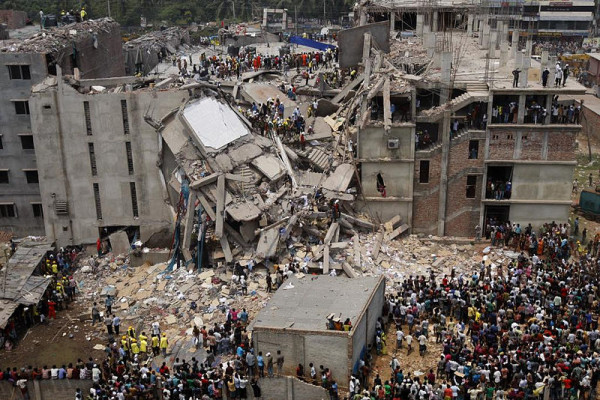Further to the Pressenza report on Mohammed Yunus call to the West to help make the clothes industry safer after nearly 1200 died in the collapse of a factory building, an international agreement has been signed by several companies to ensure fire regulations, health and safety monitoring, better salaries and working conditions as well as unionisation.
Labour groups have drawn up an industry-wide agreement which has now been signed by Swedish fashion store H&M, one of the biggest buyers of clothing made in Bangladesh, UK’s Tesco, Primak, Dutch group C&A and Inditex, owner of Zara, amongst others.
However Walmart and several other US retailers, have refused to join in, preferring to carry out their ”own inspections”.
This is not the first time people die in this kind of industrial accident created by negligent working conditions. Last November a fatal factory fire killed more than 110 people at the Tazreen Fashions plant, supplier goods for Walmart and other Western retailers.
“The International Labour Organization (ILO) welcomes the Accord on Building and Fire Safety, the support of international trade unions and apparel brands and retailers for this initiative, as well as further support it may receive.
The need for urgent improvement in workplace safety requires the industry to work together to implement a scalable and transparent plan of action that supports the vital role of government and employer and worker organizations in Bangladesh”.
On Monday, they announced steps aimed at improving conditions, such as raising the minimum wage for workers in the industry and making it easier for them to form unions.
Bangladesh’s minimum wage for garment workers is currently $38 (£25) a month, the lowest in the world.
Disasters waiting to happen
Whilst we must applaud the international response to this recent catastrophe, all too often the thirst of the West for cheap goods have created the right environment for exploitation of workers and disregard for their safety for the sake of profit. Let us hope (and work for) this initiative of international monitoring widens its remit to all workers everywhere in the world.
An even better proposal would be to reach out to such workers with the new economic models that are being studied today, and whose application have already started to show their capacity to improve lives: Cooperatives, Commoning, workers partnerships, co-management and self-management models of industry. If the multinational giants had to buy their products from self-sufficient and self-aware workers, they would have to pay the right costs and people would receive the right wages, apart from looking after their own safety.
Some Media corporations claim they are also committed to education. What better opportunity than this to set themselves in action to impart world wide information about such alternatives? This will be one of the proposals that will be made at the Pressenza workshop of the forthcoming Deutsche Welle Global Media Forum, Bonn, in June this year.






